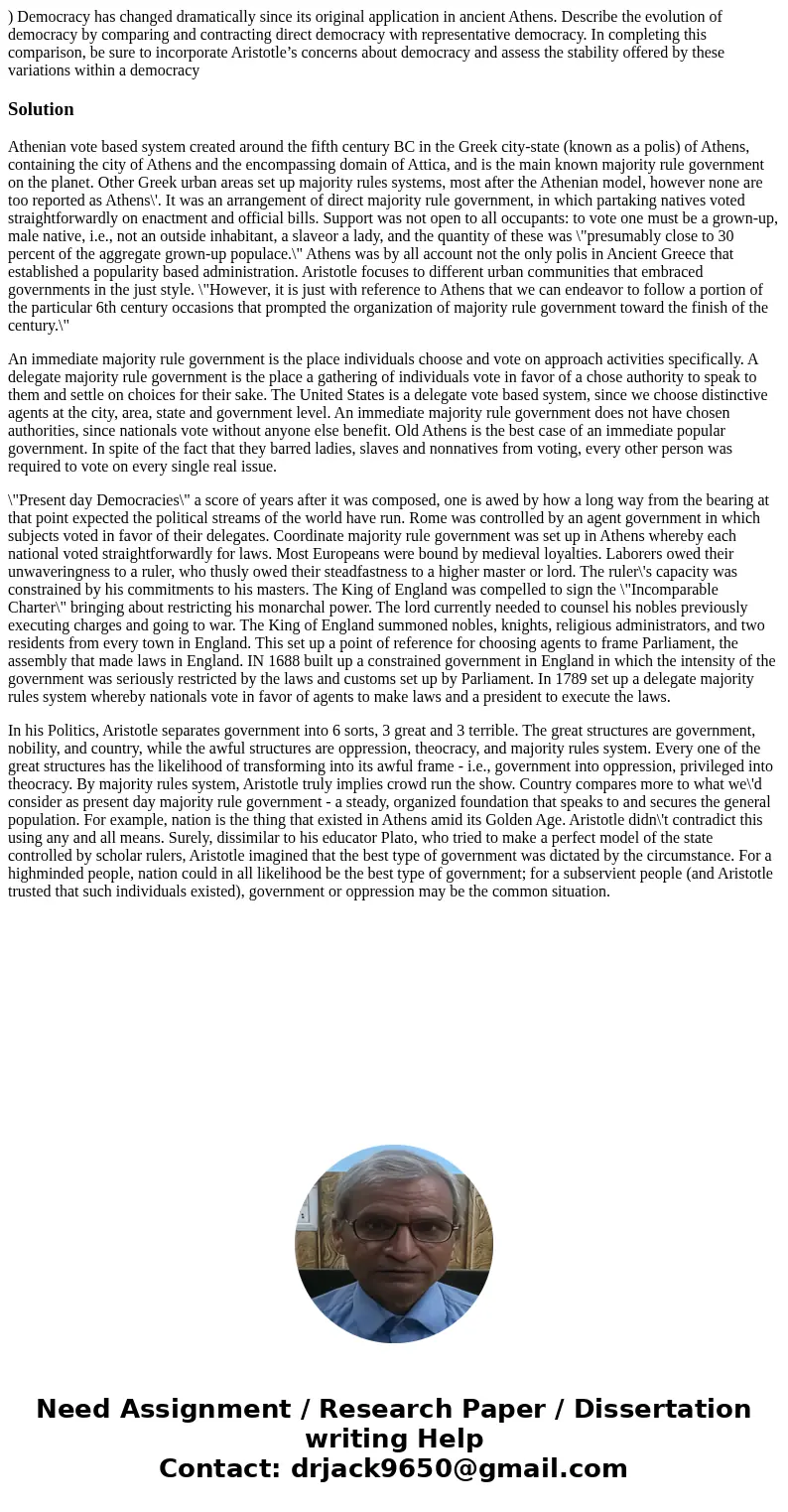Democracy has changed dramatically since its original appli
) Democracy has changed dramatically since its original application in ancient Athens. Describe the evolution of democracy by comparing and contracting direct democracy with representative democracy. In completing this comparison, be sure to incorporate Aristotle’s concerns about democracy and assess the stability offered by these variations within a democracy
Solution
Athenian vote based system created around the fifth century BC in the Greek city-state (known as a polis) of Athens, containing the city of Athens and the encompassing domain of Attica, and is the main known majority rule government on the planet. Other Greek urban areas set up majority rules systems, most after the Athenian model, however none are too reported as Athens\'. It was an arrangement of direct majority rule government, in which partaking natives voted straightforwardly on enactment and official bills. Support was not open to all occupants: to vote one must be a grown-up, male native, i.e., not an outside inhabitant, a slaveor a lady, and the quantity of these was \"presumably close to 30 percent of the aggregate grown-up populace.\" Athens was by all account not the only polis in Ancient Greece that established a popularity based administration. Aristotle focuses to different urban communities that embraced governments in the just style. \"However, it is just with reference to Athens that we can endeavor to follow a portion of the particular 6th century occasions that prompted the organization of majority rule government toward the finish of the century.\"
An immediate majority rule government is the place individuals choose and vote on approach activities specifically. A delegate majority rule government is the place a gathering of individuals vote in favor of a chose authority to speak to them and settle on choices for their sake. The United States is a delegate vote based system, since we choose distinctive agents at the city, area, state and government level. An immediate majority rule government does not have chosen authorities, since nationals vote without anyone else benefit. Old Athens is the best case of an immediate popular government. In spite of the fact that they barred ladies, slaves and nonnatives from voting, every other person was required to vote on every single real issue.
\"Present day Democracies\" a score of years after it was composed, one is awed by how a long way from the bearing at that point expected the political streams of the world have run. Rome was controlled by an agent government in which subjects voted in favor of their delegates. Coordinate majority rule government was set up in Athens whereby each national voted straightforwardly for laws. Most Europeans were bound by medieval loyalties. Laborers owed their unwaveringness to a ruler, who thusly owed their steadfastness to a higher master or lord. The ruler\'s capacity was constrained by his commitments to his masters. The King of England was compelled to sign the \"Incomparable Charter\" bringing about restricting his monarchal power. The lord currently needed to counsel his nobles previously executing charges and going to war. The King of England summoned nobles, knights, religious administrators, and two residents from every town in England. This set up a point of reference for choosing agents to frame Parliament, the assembly that made laws in England. IN 1688 built up a constrained government in England in which the intensity of the government was seriously restricted by the laws and customs set up by Parliament. In 1789 set up a delegate majority rules system whereby nationals vote in favor of agents to make laws and a president to execute the laws.
In his Politics, Aristotle separates government into 6 sorts, 3 great and 3 terrible. The great structures are government, nobility, and country, while the awful structures are oppression, theocracy, and majority rules system. Every one of the great structures has the likelihood of transforming into its awful frame - i.e., government into oppression, privileged into theocracy. By majority rules system, Aristotle truly implies crowd run the show. Country compares more to what we\'d consider as present day majority rule government - a steady, organized foundation that speaks to and secures the general population. For example, nation is the thing that existed in Athens amid its Golden Age. Aristotle didn\'t contradict this using any and all means. Surely, dissimilar to his educator Plato, who tried to make a perfect model of the state controlled by scholar rulers, Aristotle imagined that the best type of government was dictated by the circumstance. For a highminded people, nation could in all likelihood be the best type of government; for a subservient people (and Aristotle trusted that such individuals existed), government or oppression may be the common situation.

 Homework Sourse
Homework Sourse